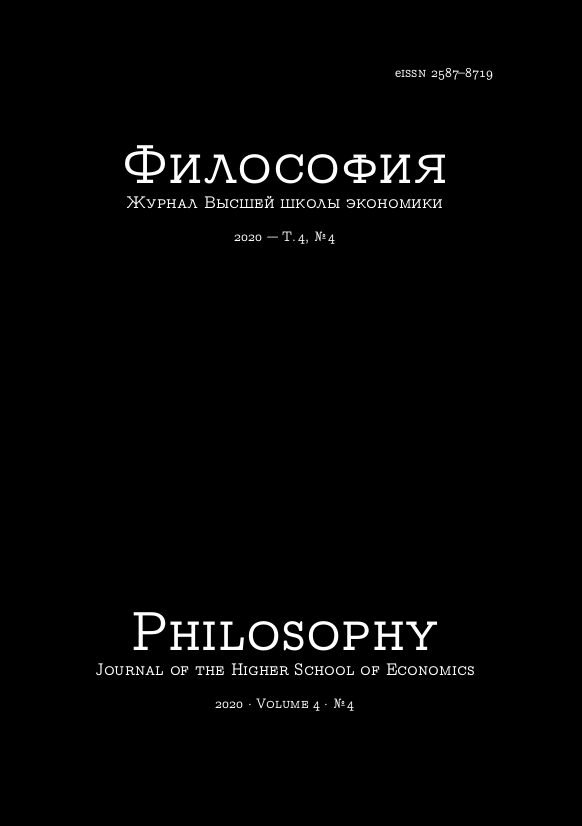Limits of Knowledge
Abstract
The editors were inspired to create this issue by a discussion that took place in the framework of the round table "Limits of Knowledge " under the auspices of the Institute of physics of the Russian Academy of Sciences and the HSE school of philosophy in autumn 2019. Although such a topic opens up an extremely wide field for research, the issue was formed around the problems of the philosophy of religion.
There are three articles in the Studies.
In Evil and Free Will Igor Gasparov offers a deep, as is always his way, and thorough analysis of the problem of evil in modern analytical philosophy. The main objects of research are the approaches of two "pillars" of the analytical philosophy of religion – Alvin Plantinga and Richard Swinburne. The non-trivial and elegant solution to the paradox of the coexistence of evil and an omnipotent being will surely wonder you.
Yevgenia Vilkova's article American Theodicy: The Content and Distinctive Features of the Apologia of David Bentley Hart is also devoted to the problem of theodicy, as well as the previous one. However, unlike the previous author, she focused on a detailed analysis of the orthodox American theologian D. B. Hart, little known to the Russian philosophical community. The article will be of interest to all those who are interested in the problem of evil and omnipotence, as well as in the analytical philosophy of religion.
We are glad and proud to present you the second panel discussion in the framework of analytical philosophy – a genre that is unfairly little spread in the Russian-speaking philosophical environment. This time, the initiator was Pavel Butakov with the provocative text How to Believe Faithfully and Firmly? Pavel himself offers a very non-trivial answer to this question. In addition, very bright and very various Russian philosophers tried to give their answers to the same question:
- Konstantin Pavlov-Pinus in a rather harsh text Оn the Benefits and Harms of Analytical Philosophy for Non-scientific Theorizing seriously criticizes some of the provisions of Pavel Butakov;
- Alexey Rakhmanin in the answer entitled Firm Faith: Desire and the Price of Mistake as a true philosopher falls into amazement, in order to find a clear path of reasoning;
- Basil Lurie in his answer to the question How to believe? carefully and thoroughly analyzes the question posed by Pavel;
- Anna Moiseeva in her answer Epistemology and Practice of Faith with academic fervor tries to understand the most subtle nuances of the approach proposed by Pavel Butakov.
And, of course, at the end of the discussion, Pavel Butakov offers his view on objections and comments of colleagues. His answer is entitled What to Believe and How to Believe It: A Response to My Interlocutors.
In the section Translations and Critical Editions, two very prominent philosophical texts are offered to your attention at once, each of which is accompanied by an interesting introductory article from the author of the translation.
Matvey Sysoev presents an article by William James How two minds can know One Thing? (1905), and Elena Kosilova presents an article by Thomas Nagel Absurd (1971).
The Philosophical Criticism section this time contains more of an independent study than just a review by Professor N. V. Motroshilova The Last Interview and a New Book by Jürgen Habermas: “No One and Nothing worth Remembering should not be forgotten in a Modern History of Philosophy”. Habermas' interview is related to the topic that has changed our lives and our world rapidly and radically — with the coronavirus. Prof. Motroshilova analyzes this interview from a philosophical point of view and gives her expert assessment. The second part of the work will deal with a new reading of the history of philosophy in general and the philosophy of Kant — in particular. What does Habermas offer and how does it relate to the current agenda? Prof. Motroshilova gives detailed analyses of it.
Alexey Gaginsky and Yulia Gorbatova
***
The section "History Method / History of the Method" presents articles that reveal the method of historical knowledge from different angles, including in historical retrospect. P. Y. Rakitin in the article traces the intellectual search of the American thinker R. W. Emerson (1803-1882), the formation of his historical concept, the place of history in his moral philosophy of transcendentalism is revealed. L. B. Sukina analyzes the experience of working with visual sources, which is particularly relevant in the situation of a visual turn, overcoming the traditional limitation of historical research by written sources; the author traces in comparison two historiographical traditions — the Western one (E. Panofsky, E. Gombrich) and Russian (from M. N. Tikhomirov and V. A. Plugin to M. Yu. Lotman and B. A. Uspensky). L. N. Mazur shows the historical modeling perspectives in a broad historiographical context; is a relatively new and undoubtedly promising method of history as rigorous science.
Downloads

Copyright (c) 2020 Philosophy. Journal of the Higher School of Economics

This work is licensed under a Creative Commons Attribution-NonCommercial 4.0 International License.





